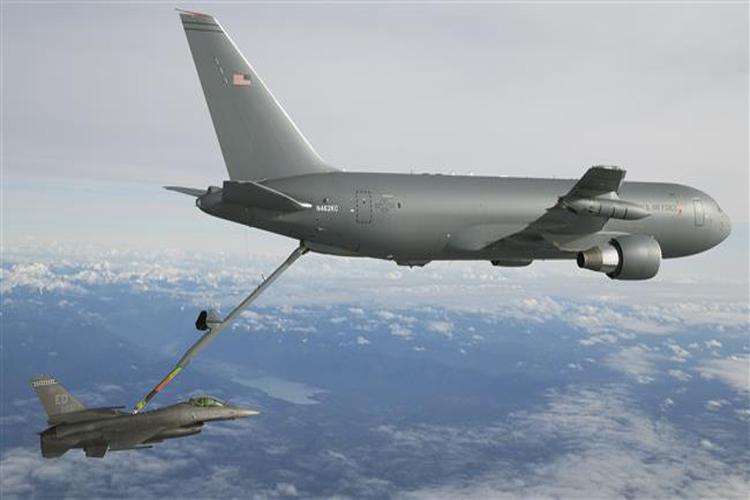
US Halts Mid-Air Refueling of the Saudi-Led Aggressive Warplanes in Yemen
Yamanyoon
The United States has ended the refueling of Saudi-UAE military aircraft for their deadly bombing campaign against Yemen amid international condemnation of Washington’s complicity in war crimes in the impoverished state, which is now considered to be on the brink of famine.
According to reports, Saudi Arabia and the US have agreed to suspend US mid-air refueling of Saudi jets.
After consultations with the United States, Riyadh demanded the stot of US military aerial refueling services, the official Saudi Press Agency (SPA) reported on Friday.
“Recently the kingdom and the coalition has increased its capability to independently conduct in-flight refueling in Yemen. As a result, in consultation with the United States, the coalition has requested cessation of support for its operations in Yemen,” the SPA said.
The US military has been refueling about 20 percent of all Saudi aircraft that conduct airstrikes on Yemen.
Senator Bernie Sanders (I-VT) welcomed the decision, saying he would press for the passage of a resolution that would call on Trump to withdraw from the war in Yemen.
“I’m glad that the Trump administration is ending US refueling of Saudi aircraft in Yemen’s devastating war… US participation in this conflict is unauthorized and unconstitutional and must end completely,” he said in a statement.
Additionally, Senator Chris Murphy (D-CT) stressed that Trump’s administration should cut down all kinds of support toward the Saudi-led war in Yemen, not just refueling.
“Why are we still helping the Saudis with targeting? Why are we still selling them the bombs at a discount?” he asked. “Now that it’s no longer a secret that the war in Yemen is a national security and humanitarian nightmare, we need to get all the way out.”
Nevertheless, many officials from the states empathized that the end of the US aerial refueling wouldn’t stop American training and military assistance for the Saudi aggression against Yemen.
The coalition’s request came amid the backdrop of US media reports that Washington planned to cease its refueling support to the coalition amid mounting criticism of the devastating Yemeni conflict, raging since 2015, and the killing of Saudi opposition journalist Jamal Khashoggi in the Saudi Consulate in Turkey.
The US secretary of defense supported Riyadh’s Decision to Halt US Refuelling of Aircraft in Yemen.
The United States supports Saudi Arabia’s decision that the Saudi-led coalition, engaged in the Yemeni conflict, should refuel its aircraft independently, without US support, US Secretary of Defence James Mattis said in a statement on Saturday.
Coalition assaults on Hodeidah
The Saudi-led coalition alongside with its mercenaries on ground, launched a vast offensive operation against the port city of Hodeidah, which has escalated the humanitarian catastrophe in the country and increasing the risk the lives of millions of civilians.
Mohammed Ali al-Houthi, the head of the Supreme Revolutionary Committee, wrote in a column published by the Washington Post on Friday that the continued escalation of attacks against the port city of Hodeida in Yemen by the U.S.-Saudi-Emirati coalition confirms that the American calls for a cease-fire are nothing but empty talk.
He said the ceasefire call was an attempt “to save face after the humiliation” caused by the murder of Washington Post columnist Khashoggi, a critic of Saudi policy, that has strained Riyadh’s relationship with the West.
Pentagon officials have been involved in planning the new Saudi-led attack on Hodeidah, the Intelligence Online news website said on Thursday.
The Pentagon provided Saudi Arabia and the UAE vital information to launch a vast offensive on Hodeidah port city, the site said.
Pentagon officials met in the Saudi capital of Riyadh with Saudi and Emirati officers to negotiate and plan out the attack on Yemen’s Hodeidah.
“Washington handed over two more surveillance and spy planes to Riyadh before the attack on Hodeidah,” the website said.
However, the large offensive has accomplished nothing but the killing of civilians and destroying vital infrastructure, latest of which was the complete destruction of the Red Sea mills silo, which were reopened in 2016 after having undergone expansions, updates and development in machinery, equipment and the ability for a daily production, producing the equivalent of 2,000 tons per day of white flour.
In a preset time, a girl lost her life and nine other civilians lost their lives when Saudi artillery and mortar shells rained down on the 7th of July neighborhood in Hodeidah city, destroying one of the civilian’s homes and damaging dozens of others.
If Saudi Arabia along with its allies and militias on the ground don’t halt the attacks on Hodeidah, more than 600,000 thousands of vulnerable civilians in Hodeidah, half are children, will suffer and being on at risk of cholera and malnutrition.
The port of the city is very essential for civilians, where more than %80 of humanitarian aid, food and fuel goes through, so if it gets damaged or stopped working, the UN may declare famine in the country, despite the fact that Saudi-led coalition vast offensive has resulted already in the stop of aid from leaving Hodeidah, endangering 14 million starving Yemenis.
The World Food Programme said on Thursday it planned to double food assistance for Yemen, aiming to reach up to 14 million people “to avert mass starvation”.
Air strikes by the coalition, which relies on Western arms and intelligence, have often hit schools, hospitals and markets, killing thousands of Yemeni civilians.
U.N. special envoy Martin Griffiths hopes to convene Yemen’s warring parties for peace talks by the end of the year.
